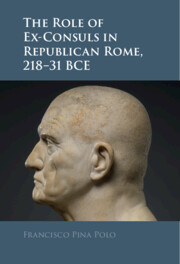Refine search
Actions for selected content:
3 results
Chapter 19 - Conclusion: An Intellectual between Tradition and Power
-
- Book:
- Cicero
- Published online:
- 10 June 2025
- Print publication:
- 29 May 2025, pp 715-726
-
- Chapter
- Export citation

The Role of Ex-Consuls in Republican Rome, 218–31 BCE
-
- Published online:
- 01 May 2025
- Print publication:
- 15 May 2025
7 - Local Aspirations and Statues of Emperors in Roman North Africa
-
-
- Book:
- The Social Dynamics of Roman Imperial Imagery
- Published online:
- 09 November 2020
- Print publication:
- 12 November 2020, pp 159-179
-
- Chapter
- Export citation
